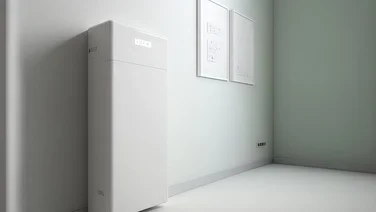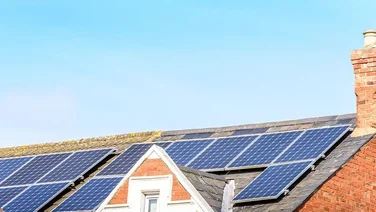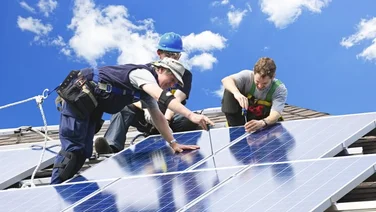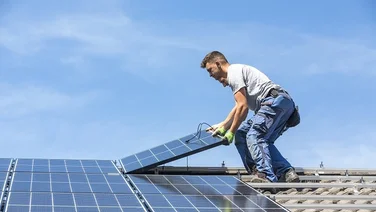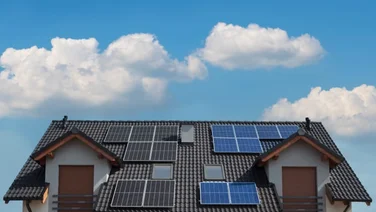We receive a small fee from trusted installers when you request a quote through our site. This helps us keep our content independent, well-researched and up to date – Learn more
✔ The growth of solar power in the UK has provided a new home for pigeons
✔ Pigeons can reduce the efficiency of your solar panels and damage the wiring
✔ It’s fairly easy and inexpensive to keep your panels protected
Build it and they will come. While humans are busy paying solar panel prices for energy, pigeons have recognised its potential for something else: shelter. The huge surge in solar power’s popularity over the past decade has ushered in a golden era for the urban bird.
Unfortunately, when pigeons get busy building a home, they tend to get busy wrecking another. The damage and mess they create can often be terrible, and no amount of reasoning will dissuade them.
If you own solar panels, you also own a pigeon magnet. It’s as simple as that.
In this article, we’ll go into the nitty gritty of how pigeons can affect your home, and then explain the ways you can pigeon-proof your solar panels – along with the typical costs. For other ways to protect your solar panels, use our Top 7 ways to protect your solar panels guide on how to do that.
If you haven’t yet switched to solar, but are keen to get a move on, simply pop your details in this short form and let us do the hard work. We’ll pass your details on to our reliable, trusted installers, who will be in touch with free quotes to compare.
Where do you want to install solar panels?
Get started
Three pigeons gaze imperiously over a rooftop solar panel
Do solar panels need pigeon proofing?
In the same way that houses attract humans, solar panels can attract birds like pigeons.
Not all systems attract pigeons, and there’s no obvious rhyme or reason to explain which systems are – or aren’t – attractive.
But considering there are 13.5 million pigeons and 1.3 million households with solar panels in the UK, some of you will inevitably receive these avian visitors.
Whenever a solar PV system is set up on top of a house, installers leave a gap between the panels and the roof to make space for electrical equipment. To the shrewd pigeon, this gap is a safe, warm, and comfortable place to settle down in.
Can birds damage solar panels?
The solar panel is a famously sturdy option in the realm of renewable energy. It’s made of tough, tempered ‘safety glass’, it has no moving parts, and it can last upwards of 30-40 years just sitting on your roof.
It’s bonkers to think, then, that a family of pigeons can significantly mess with your panels. Largely comprising flesh, hollow bone and feather, the domestic pigeon (Columba livia domestica) will make a mockery of your £6,000 solar PV array and your home. But how exactly?
Poo
You might have guessed this one. Pigeons need to go somewhere, so why not exactly where they live and sleep?
Once your winged guests have settled in, you’ll start to see a neverending build up of pigeon faeces coating your roof tiles, driveway, garden, and – most importantly – your solar panels.
Naturally, poo-coated solar panels do not perform as efficiently as their clean counterparts, so there’ll be a steady drop in the amount of energy they’re producing.
Visual unpleasantness
That’s putting it mildly. If you think hordes of pigeons in city centres look a little gross, imagine them on your roof. Of course, ‘horde’ might be a little extreme – it entirely depends on the size of the family.
Combine the pigeons on your roof with the faeces all over your property, and you’ve got yourself a pretty unpleasant scene.
Damage to your panels
Along with their poo affecting the efficiency of your solar panels, pigeons can also cause more structural damage.
If you’re unlucky enough to end up with a couple of weighty adult pigeons (along with a few ‘squabs’, i.e. baby pigeons), this cumbersome lot could end up breaking some of the MC4 clips that connect the wires to the back of your solar panels.
In the worse case scenario, particularly restless and sizeable pigeons can dislodge the wiring entirely and cause your panels to malfunction.
Guttering blockages
About as grim as it sounds. There’s only so much a pigeon can foul and nest on your roof before the rains wash the mess away, wiping the slate clean for another spell.
But where does the mess go? Into your gutter. Feathers, twigs, poo, the lot. Allow this to happen enough times, and you’ll have to get your drainpipes unclogged – not nice, not cheap.
Noise
Pigeons aren’t the most light-footed of creatures, and you’ll typically notice this at about 4:30am. A family of birds living on your roof is not a silent affair – think scuffling, scratching, cooing, flapping. It’s a grotesque avian symphony playing on repeat.
Mites
Pigeons sometimes bring little friends with them, and their potential for home invasion is pretty nauseating.
Two types of microscopic bug – the northern fowl mite and the red fowl mite – travel the world on the back of a pigeon, but they’ll hop off if they find a decent roof. Then they’ll go through the roof and get comfortable in your home.
It might sound fairly harmless, but mites will get into your clothes and furniture until you can’t stop itching.
Where do you want to install solar panels?
Get startedHow to protect your solar panels from pigeons
- Keep everything clean
- Set up fake owls
- Set up mesh and spikes
- Get roof-integrated solar panels
Keep everything clean
One of the reasons pigeons will be knocking around your property in the first place is food. If your garden is clean, your rubbish bags are properly tied up, your bins are sealed, and any pet food is stored indoors, you’ll be sending quite a clear ‘no food’ signal to scavenging pigeons.
Similarly, a garden full of twigs and leaves is a sweet prospect for a pigeon. To the urban bird, that’s basically just a build-it-yourself nest that’s yet to be constructed. Keep your garden clear of natural debris, otherwise you’re essentially just a big columbiform IKEA.
Set up fake owls
Pigeons hate birds of prey, and they’re not very good at distinguishing the real ones from the fakes. A plastic owl on your rooftop is a surprisingly effective way of deterring animals. You can even get one with a head that swivels in the breeze, so even the most discerning pigeons get duped.
Similarly, jackdaws and squirrels aren’t huge fans of carnivorous birds. Your faux owl will strike fear into the hearts of any critters that step near.
Set up mesh and spikes
The most effective way to stop pigeons getting under your solar panels is literally just to block their way in. You can’t get rid of the gap between the panels and the roof, but you can barricade the sides.
Many pest control companies in the UK will fit the edges of your solar panels with a galvanised steel mesh, designed to halt even the hardiest of feathered homewreckers. The mesh is fitted securely using a variety of clamps, ties, and wires, until the space beneath your solar panels is virtually impenetrable.
Some homeowners even combine mesh with spikes, which might be necessary if you live near a particularly ambitious bunch of birds.
Get roof-integrated solar panels
If you can afford the extra cost, roof-integrated solar panels are the perfect solution to your pigeon problems.
Birds, squirrels, and all other troublesome animals will find it impossible to get behind roof-integrated modules, as they lie completely flat on your roof.
How to remove pigeons from under solar panels
Sometimes it can be too late to try preventative measures. If pigeons have already settled in, mesh wire will just trap them and create something pretty gruesome. To cleanse your roof of pigeons, you’ll normally require the services of a professional pest control company.
Specially trained people will ‘shoo’ the pigeons away, clean off as much poo as possible (without damaging the wiring), and then apply a biocide to kill any mites and break down any remaining faeces. Once this is done, they’ll be able to install the mesh and spikes.
How much does it cost to pigeon proof solar panels?
It typically costs around £500-£700 to have a standard residential solar PV system (3-4kW) pigeon proofed.
Of course, the price varies depending on the exact size of the solar array, and the accessibility of the roof (i.e. the extent of the scaffolding required).
Additionally, if you need to have pigeons cleared out, this may add to the fee.
How much does it cost to remove pigeons from your solar panels?
It typically costs £550-£750 to remove pigeons from solar panels, if you also want to stop pigeons from making nests under your array ever again.
The person installing anti-pigeon measures can temporarily remove your pigeons by approaching them and making loud noises.
Then they’ll just need to give the roof and the underside of your panels a clean, and clear away any nests and mess the pigeons have left.
The installer can then proceed, so the pigeons’ initial presence doesn’t cause many issues – but the cleaning they have to carry out, as well as the risk of the pigeons attacking or interfering will usually add to the cost.
Can you pigeon-proof solar panels yourself?
You may be able to pigeon-proof your own solar panels – but it’s dangerous, and you shouldn’t take it on unless you’re confident you can do so without damaging either yourself or your roof.
Whether you’re looking to secure fake owls to your roof or setting up mesh and spikes, both require someone to stand on your roof while performing manual labour.
We’d usually recommend you hire a professional for these tasks, rather than risk your wellbeing to save as little as £500.
You can still contribute, though. If you keep your garden free of leaves, twigs, rubbish, and food, you’ll take away the vital tools pigeons need to make their nests.
Protecting your solar panels against jackdaws and squirrels
It’s not just pigeons that see solar panels as an ideal home. Quite understandably, jackdaws and squirrels also like to get cosy beneath a slab of silicon. Not together, mind. If there’s any positive to what we’re telling you here, it’s that you’ll only end up with an infestation of one species.
If jackdaws get under your panels, this can pose even bigger problems than pigeons. Jackdaws are particularly industrious when it comes to building nests, and they’ll ram the underside of your panels with all manner of sticks, twigs, and leaves.
All this material can create ‘hot spots’ on your panels, which cause particular solar cells to overheat and reduce the overall efficiency of the system.
Squirrels, meanwhile, have something that pigeons and jackdaws don’t – teeth. Add a pair of incisors into the mix, and the potential for damage opens up spectacularly. What’s more, squirrels are desperately concerned about their incisors overgrowing, so habitual gnawing is the best solution.
This means squirrels can – and will – gnaw their way through your solar panels’ cables and components.

If you want an eco-friendly roof that’s supposed to be an environment for animals, why not consider a green roof?
Next steps
That’s all you need to know about solar panels and pigeons. In short: pigeons like them and pigeons damage them, but it’s fairly easy to keep the pigeons out.
If you don’t yet have panels installed but think it’s time, you should take the plunge. Our latest National Home Energy Survey revealed that 65% of people are likely to buy a house with solar panels.
If you want to go solar, just pop your details in this short form. We’ll match you with reliable, trusted installers in your area, and they’ll give you a call.


